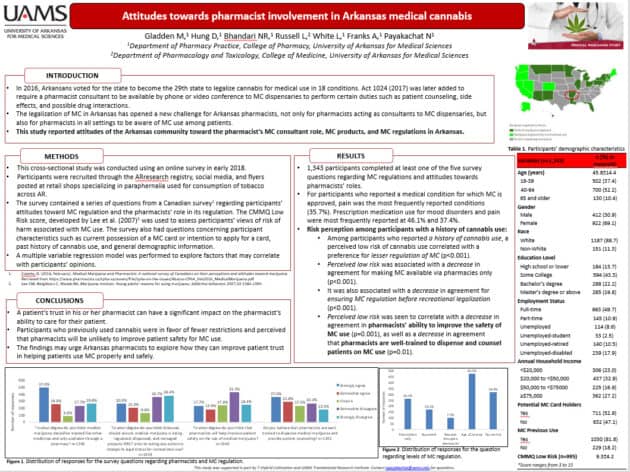This poster was presented at the 2018 Arkansas Association of Health-System Pharmacists Fall Seminar.

Community Attitudes toward Arkansas Medical Cannabis Regulation and Pharmacists’ Roles
Gladden M,1 Hung D,1 Bhandari NR,1 Russell L,2 White L,1 Franks A,1 Payakachat N1
1 Department of Pharmacy Practice, College of Pharmacy, University of Arkansas for Medical Sciences
2 Department of Pharmacology and Toxicology, College of Medicine, University of Arkansas for Medical Sciences
Background
In 2016, Arkansas became the 29th state to legalize cannabis for medical use. The Act 1024 (2017) specifies that a pharmacist consultant is required within dispensaries to counsel patients on proper medical cannabis (MC) use, expected side effects, and drug interactions. However, there is a limited literature around community attitudes toward the pharmacist’s role in MC dispensaries.
Objectives
This study explored the attitudes of the Arkansas community toward MC regulation and pharmacists’ roles in dispensing MC. We also examined how participant characteristics were associated with opinions on pharmacist’ roles.
Methods
This cross-sectional survey study was conducted in early 2018 (UAMS IRB#207440). The self-administered online survey was distributed via social media and posted flyers. The survey contained questions regarding participants’ attitudes toward MC regulation, risks associated with cannabis use, and pharmacists’ roles. Additionally, participant characteristics such as current possession of a MC card or intention to apply for it, history of cannabis use, and other demographics were collected. A regression model was performed to explore factors related to participants’ opinions.
Results
1,343 respondents completed at least one of five questions regarding MC regulations and attitudes towards pharmacists’ roles. The average age of respondents was 45.8 (±14.5) years. The majority were 40-64 years (52.2%), female (69.1%), white (88.7%), and had completed some college education (44.3%). Most respondents reported a history of cannabis use (81.8%) and possession or intention to apply for a MC card (52.9%). Of the conditions approved for MC use, pain was the most frequently reported (35.7%). Similarly, prescription use for mood disorders and pain were most frequently reported at 46.1% and 37.4%. Participants’ perceived low risk of cannabis use was linked to a preference for lesser control of MC (β=-0.08, p<0.001). It was also associated with a decrease in agreement for a) making MC available via pharmacies only (β=-0.08, p=<0.001), b) ensuring regulation of MC before recreational legalization (β=-0.05, p<0.001), c) pharmacists could improve patient safety related to use of MC (β=-0.04, p=0.001), and d) pharmacists are well-trained to dispense and counsel patients on MC (β=-0.03, p=0.01).
Conclusion
Respondents who previously used cannabis were in favor of fewer restrictions and perceived that pharmacists would be unlikely to improve patient safety for MC use. The findings may urge Arkansas pharmacists explore how they can improve patient trust in helping patients to use MC properly and safely.
Acknowledgement
Funding from 7-Hybrid Cultivation LLC and internal support from the UAMS Translational Research Institute.
